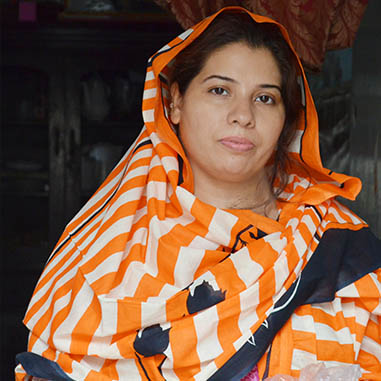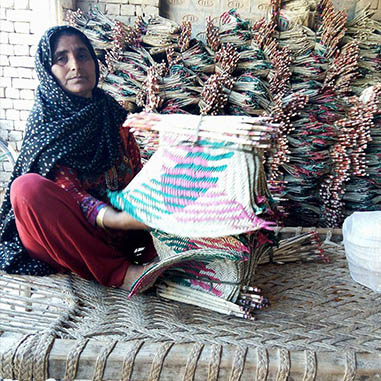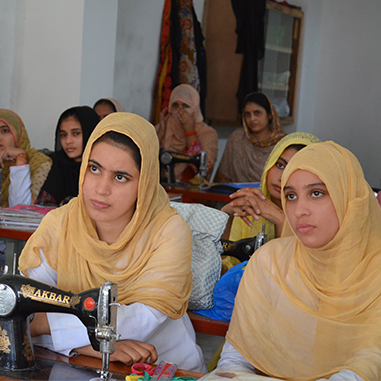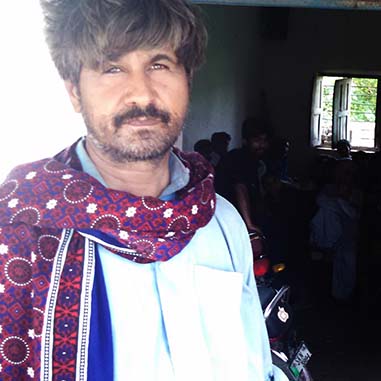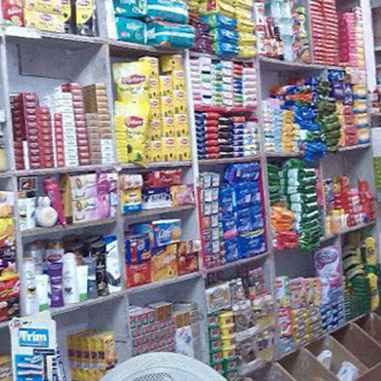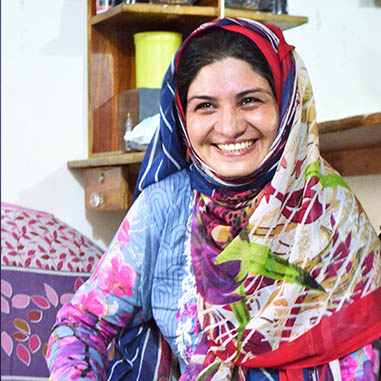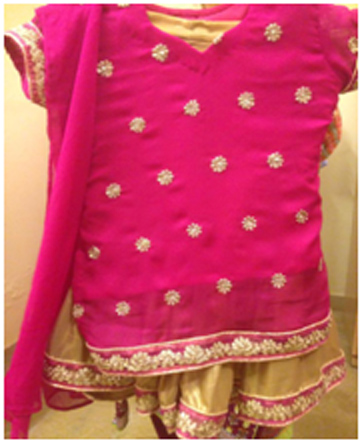Our Impact
Leadership is not about a title or a designation. It's about impact, influence and inspiration. Impact involves getting results, influence is about spreading the passion you have for your work, and you have to inspire team-mates and customers.
Active Clients
Outstanding Loan (Rs.)
Served Clients
Total Disbursements (Rs.)
Resident of Sheikhupura district’s Morranwalla village, Ali Rizwan serves as an uncrowned leader of a group of ten young men that rose beyond their societal expectations, and mobilized change at the grassroots. Striving to transform the mindsets of conservative inhabitants of their village, Ali and his team are raising important questions and offering legal assistance for facilitating girl-child education. Although it would be fair to say that Ali from a very young age felt that women were down-trodden in society by observing the treatment of his sister at the hands of their parents in comparison to him, it was not until he attended the first theatre workshop organized by Community Support Concern’s enthusiastic team in Sheikhupura, that Ali Rizwan realized how he could take an active stance against the discrimination faced by women.
Through its Enhanced Women Socioeconomic Development project, CSC provided Ali and his team with essential information about skills enhancement projects for women, the issue of unregistered female births, unavailing of CNICs, misfiling of marriage contracts, and unlawful settlement of divorces. From that point onwards, Ali Rizwan has attended multiple workshops to acquire paralegal training and uses the information gained through these to tackle cases in his village.
Sumaira Shabbir generates PKR 10,000 profit on a weekly basis while staying within the boundaries of her home in Walton. Her lace designing and stitching business, launched seven years ago with CSC’s easy to pay loan scheme, although started as a two-person initiative with Sumaira and her mother-in-law working on their sewing machines, has now transformed into a training center. The training center engages with dozens of girls living in the vicinity, who also work under Sumaira’s guidance, earning a respectable wage for their families. Stitching the season’s favorite fabric accessories like tassels, sequin-adorned ribbons, and crochet laces, each of these girls looks up to Sumaira as their inspiration.
Sumaira, in an interview with the CSC team, showcased some of her most recent products, talking with utmost pride about the delicate handicraft work that went into designing each specimen, all of which was done by hand. Her family members could not hide their pride as Sumaira narrated how, by virtue of the last loan she had received from CSC, the business was exponentially expand. She increased her production by utilizing the amount of raw material, which she procured herself from Shah Alami bazaar. With CSC’s help, Sumaira was not only able to become self-sufficient, but also support her family and generate change in her community by hiring unemployed women and teaching them a skill that they could monetize to stand on their own two feet as economically independent women
Haseena Mai has developed a successful microenterprise out of her hand-made fans and skull caps, based on immaculate artisanship and financial knowledge, which helped her provide high quality products and comply with all requirements of the loan schemes. She has been able to not only utilize her artisanship herself but also transfer it to her husband and kids who have helped her out with the production and selling off to market and individual customers. Her products stand out among the rest of the market, which has resulted in quick escalation of revenues for the business.
A major success factor for Haseena has been her financial understanding which always motivated her to stay at pace with the demands of the business as it expanded. She has acquired two loans from CEIP, starting with PKR 20,000 in the first cycle that started in February 2016. By maintaining liquidity cushion, Haseena had been able to add personal finances alongside the loan in setting up the business, and made regular payments which made her eligible for second loan cycle of PKR 25,000 that she utilized to expand the enterprise production capacity.
Social Welfare Society is among the various Community Based Organisation (CBOs) initiated and supported by CSC through its Enhanced Women’s Socio Economic Development Project (Phase-II) in Shiekhupura, Punjab. This self-sustaining CBO is constituted of a General Body for members, who then elect an Executive Board that contributes funds for the organisation’s sustainability. Social Welfare Society has organized around two key functions of Women Skills Enhancement, and Healthcare, which are enhancing female economic participation, and tackling health issues in the region.
The Women Skills Enhancement function of Social Welfare Society is a vocational training institute that has identified core competencies of the young girls in the Kot Abdul Malik locality of Sheikhupura, and are providing stitching and embroidery trainings. The courses are charged at a minimal fee, and equip aspiring young girls with necessary skills for establishing their own tailoring businesses, or acquiring employment as home-based workers for other local entrepreneurs.
The key success factor for Mureed Hussain has been his unswerving diligence that allowed him to establish his business despite various physical and economic hindrances. Despite having lost an arm in a workplace accident, Mureed adapted to his deteriorated situation and explored the various things that he could do in this handicapped position. Mureed’s impeccable temperament did not shy away from starting small. He aligned his meager finances in setting up a tea stall, but was observant of gauging the consumption cycles. He diversified the products to include juice, milkshakes, ice cream, and fruits as well. This understanding of weather-determined demand hedged Mureed’s products, ensuring that there is not bad day for customers to have one of his products. He now aims to expand his shop’s operational size. He believes that having a large seating area, both indoor and outdoor, will allow him reach the optimum customizability in visitor experience, and accommodate a fairly large number of customers at the same time.
The greatest challenge faced by Mureed has been regarding his physical disability, that hindered him in doing tasks that he had been skilled in. Being an employee at a warehouse, Mureed lost his arm in a machine-inflicted workplace accident, and was laid off due to his inability to perform the same task afterwards. He was able to convince himself that despite being skilled at a different and more valuable task once, he would not shy away from performing chores that are considered less worthy by the society, for it is not the nature of the task but the will of the performer that leads to success. After initiating his business, Mureed faced problems in scaling up the operations which he required to increase profits
Qurat-Ul-Ain is married to a laborer who is a daily wage earner working at different jobs around the city. It was difficult for the family to make ends meet and Qurat-Ul-Ain was constantly pressurized by her in-laws to borrow from her own family and friends. She realised that she needed to break tradition and start a business of her own. Doing so would ensure improvement in living conditions for her family and the elimination of accumulated debt. She decided to set up a small general store catering to her neighbouring residents
Setting up her own general store came with its own set of difficulties. Qurat-Ul-Ain had no prior experience in dealing with customers while old lenders began reaching out to the general store for settlement of previous debts. This meant that Qurat-Ul-Ain had no resources to replenish stocks at her store on a regular basis. Her strive to improve her living conditions brought her to CEIP. She acquired a loan which she used to restock her general store in addition to adding a wider variety of products to sell.
The loan gave her an opportunity to generate a larger revenue stream and elevate the lifestyle of her family while reducing their burden and dependence on debt. She now ensures that her monthly utility bills are paid on time and enables her to avoid late payment surcharges. She has continued to reinvest her profits back into the business to further diversify the range of products it carries. There is no other general store except hers in the immediate vicinity, so females find it easier to utilise her services rather than commuting to and from the city. She dreams of moving her general store to a bigger and better location one day.
Rout’s successes as a microentrepreneur are her immaculate networking skills and presentable demeanor. These two qualities have helped Rout transcend through different stages of her microenterprise. Having started her food preparation and supply business, Rout utilized her networking skills to convince people for availing her service and grew the clientele by branching out through existing clients.
Being a Christian woman in predominantly Muslim city, Rout has faced hindrance in becoming acceptable to her prospective market. Prejudices against minority religions, especially those related to hygiene, once restricted Rout’s ability to grow her clientele. However, with her networking skills, Rout was able to find channels of inclusive and accepting clients that would gauge the food prepared by Rout on its taste and presentation, and not on the religious identity of the person who prepared it. She feels that there is growing pluralism in the society, and the concern about having food prepared by a Christian woman is decreasing. While she might not realize it, Rout herself is playing a significant part in doing away with that barrier for her community’s social and economic inclusion. She has formalized an effective marketing techniques, and has printed business cards that are passed on to clients for referrals, and are distributed among target areas by her son as well…
Fazeelat’s temperament for sustained hard work, and her strong communication skills have been useful in keeping her motivated through the nascent stages of the business and convincing the community members in developing extensive trust in her beauty services, and beautician-training program. Fazeelat upholds the belief that “a person is nothing without hard work, because achievement requires commitment”. She has utilized her communication as not only an effective marketing tool, but also for engaging with and training over 10 trainees that have helped meet her costs, and 2 employees that have supported her in various tasks.
Before Fazeelat start her beauty parlor, she had to face challenges in setting up her business and making it sustainable that were two-fold; relating to her family’s disparate financial standing, and to the lack of receptiveness in the neighborhood.Firstly, having being married off to person who couldn’t match her parent’s living standards, Fazeelat was faced with deteriorated living conditions, that were demanding of initiating a business, but not conducive for it…
Irshad’s success as a microentrepreneur is her understanding of people’s needs and affordability, and intelligent networking skills. These two qualities have helped Irshad establish her business of renting bridal dresses. She identified the niche in the market for bridal dresses on rent, and successfully devised an attractive alternative to buying dresses that would only to be worn once. In order to make inroads into the bridal market, Irshad has used effective networking, and marketing skills, and has not only advertised her service through banners on streets, and commercial on Catholic Channel, but also created linkages with beauty parlors and caterers that interact with potential customers. Having utilized various marketing techniques, Irshad has created a sustained demand for her dresses, and often completely rents out her entire collection.
Her business has had a very positive impact on her income, and currently she is saving a proportion of her income to update her collection of bridal dresses, for which she works with the tailors herself, ensuring high quality. Once her revenue increases as a result of more dresses being rented out, she plans to rent a small shop to serve as an outlet where brides and their families can visit and select dresses…
The owner of a grocery store, popular among residents of Green-Town, Lahore, for its reliability and efficiency, Shameem is one of the handful women seen standing behind a counter laden with popular Pakistani snacks. The role of a shop-keeper is primarily associated to men, but Shameem is proudly selling products to her a growing number of customers that are coming to terms with the change she is inducing.
Now a grandmother, Shameem still maintains her economic independence and continues to be of commercial aid to her partner whose income fluctuates on a daily basis due to unpredictable demand and supply mechanisms of the market.Her transition from being a housewife, to a street-vendor riding a donkey-pulled cart through Lahore’s streets, and now ultimately to a permanent asset holder, is inspiring for women of all ages and backgrounds. Her journey though the rough and tedious path of empowerment was facilitated by CSC’s continuous support. She is currently on her 6th loan cycle worth PKR 150,000, earning a profit of over PKR 3,000 a day
Rahiba Amjad, a long-running borrower of CSC, does two things at once, she breaks one of the countless stereotypes that is knitted into the mindsets of inhabitants of the Pakistani society that women cannot work and she also simultaneously provides affordable education to under-privileged children from Green-town who would otherwise be denied this basic necessity. Giving hundreds of children from both genders enrolled in primary and middle school grades, tuition, is not her only contribution to society, she also upholds the concept of integrated conjugal roles, financially contributing to her family’s monthly income and has also hired other previously unemployed female teachers who she personally trained to accompany her in her mission.
However, her life was not always running in such a productive manner, she started her business before getting married, at her parent’s house in a single room and after tying the knot to her spouse her brother’s sold her furniture and asked her to move out, a classic description of patriarchal supremacy. With no individual assets of her own and her husband’s inconsistent income she approached Community Support Concern’s head-office and after a period of 7 years she is now on her seventh loan cycle, has paid the previous installments and is getting a school constructed to have greater infrastructure facilities for her devoted students. The quality of life for her and her family has drastically increased and she is an inspiration for her community and women in the education department all across Lahore
Hina, from the area of Garhi Shahu in Lahore, is the only earning hand in her family. Being partly trained in the art of making stuffed toys, Hina was only able to earn a meager Rs. 3500 per month. This was barely enough to provide for her and her 4 children. The search for better financial prospects led her to find CEIP, from where she secured a loan to manufacture and market her stuffed toys.
The biggest hurdle faced by Hina was unavailability of a trained workforce. She was able to train girls around her community and later employ them at her own business unit. In the process, she was able to significantly improve her own entrepreneurial and technical skills by undergoing several trainings. Her in-laws and husband, who had initially not supported her, finally began to appreciate her success when the economic results became more prominent.
Hina, in the coming years, wants to expand her business by moving into a manufacturing space that she owns and also wants to expand her business to other cities of Pakistan. Being a pragmatist, Hina understands that as her business grows, so will her need for skilled workers. She has decided to save up and invest in her very own training center where she will train and empower women who she then plans to hire. Hina From Garhi Shahu Lahore.
Koser Parveen belongs to Muhallah Awami Colony in Lahore. A widowed mother of two, Koser decided to step up and become economically self-reliant and seeked CEIP’s help. During a conversation with CEIP, Koser revealed that she is currently married to her second husband who is supportive of her dedication and consistency towards her work. She started her business by stitching clothes and headscarves with materials brought to her by her clientele. After spending some time on her business, Koser began stitching ready-to-wear articles of clothing from materials she procured herself. Purchasing materials herself meant that Koser had to mortgage or sell items in her household to invest in her business.
CSC saw this is as a potential opportunity for intervention and stepped in to provide Koser with access to financial support. She used the funds to procure a sewing machine for her stitching unit and on account of her exceptional sewing skills, was able to make a solid reputation for herself within a short period of time. She has used her profits to fulfil a lifelong dream of owning her very own house and financing her son’s resettlement to Saudi Arabia.
Kauser is a model recipient of financing opportunities from CEIP as she has not only made considerable progress bu is also giving back to her community by training several girls to work as part of her stitching unit. She can now save a reasonable amount every month and her living conditions have improved drastically.
Nazia Sulaiman hails from Nawaz Colony, Green Town, Lahore and has a story repeated once too often in a poverty stricken society like ours. Nazia is a mother of five and wanted to be able to provide her children with a basic education. Her husband, who owned a small tuck shop fell sick quite often and Nazia did not have the resources to get him the medical attention he required. She decided to make a significant change in her life. After reaching out to CSC for a small loan, Nazia was faced with an uphill task. She had a sick husband to look after, hostile neighbours and unsympathetic in-laws. She decided to stay strong and persevere to improve the living conditions of her family.
Initially, Nazia did not fully understand the art of bangle making because of her inexperience but was able to develop her skill through systematic training sessions that were organized for her by CEIP. Her husband, who had earlier been quite unsupportive soon realized that she had the potential to lead the family out of poverty. She is now also able to afford proper treatment for her husband, educate her children and improve the quality of life of her family. She now makes between 35 to 40 thousand a month! Nazia reached out to CSC once again during the ‘Women Ride with Pride’ initiative. She was loaned a hybrid two-wheeler that she now uses as a means of transport for family. She is repaying the society by imparting training to 35 girls in the art of bangle making. She has become a symbol of strength not just to her family and in-laws but also for her community.
Ameer Baksh, a cobbler by profession had been working hard to make ends meet. Any revenue that he generated was reinvested in his business to purchase raw material required to continue working the following day. Lack of liquidity in his financial resources implied that he could contribute very little to his household. Additionally, frequent purchases also led to more time spent in the markets. The latter had detrimental implications for his business. Time spent away from his workshop greatly diminished his operational abilities while buying in smaller quantities implied higher prices for his purchases. All of this meant that his production capacity was limited to just 2 or 3 shoes at a time.
Ameer reached out to CEIP for a small loan under the PMIFL Scheme. On securing the loan from CEIP, he was able to introduce liquidity in his business’s’ finances. He was now in a position to buy raw materials in bulk at a discounted rate while saving time from not having to make multiple trips to the market, thus greatly increasing his efficiency and daily output of shoes. Ameer has now reached a point where he can balance the financial requirements of his family and business in a comfortable manner.
He has expanded his operational capabilities by adding three semi-skilled workers to his team who help him along the manufacturing line that he has set up within his small workshop. Ameer now aspires to expand his business by reaching out to larger players in the shoemaking industry and supply his products to them while continuing to expand his operation by hiring more workers. Ameer has also planned on supplementing his income by diversifying into the livestock trade. Ameer’s story is a perfect example of how small contributions in addition to an individual’s hard work can achieve so much.
Asiya Muhammad Din hails from Gul Bahar Colony in Lahore. On account of her hard work and motivation, Asiya has developed an intricate eye for the embellishment of stone work on clothes and furnishing accessories. She started her career working as a sales girl at one of the local high-end retail outlets of the posh suburbs of Lahore. After working at this position for a few years, Asiya moved on to actualizing her dream of becoming an entrepreneur by starting a small business based on her knowledge of stone work and applying it to a range of different products.
Asiya hopes to further expand her manufacturing business to a larger manufacturing unit where she could employ a larger number workers and being able to develop newer and modern varieties of furnishing accessories. Asiya always understood the importance of a suitable retail outlet with aesthetically displayed and presented products for the end user. After overcoming unfavourable circumstances at home, she has been able to work towards her own brand.
Asiya’s zeal and passion was greatly appreciated by CEIP and thus the team decided to provide her with financing to expand her existing business, bringing her one step closer to realising her dream of setting up a large-scale retail outlet in the near future. Asiya now fine tunes her products to adhere to customer demand and now plans on involving her brother as a marketing liaison in her existing business. Asiya has been able to renovate her home and greatly alleviate not only her own, but the community’s standard of living by involving other women from her area as helping trainees her business
Rukhsana Bibi is one of the 50 landless women who have learnt new agricultural techniques through CSC’s ‘Move Forward to Regain Prosperous Lives’ project developed under a private-public partnership with Punjab’s agricultural department in selected Union Councils of two Districts.
Standing proudly over her bumper wheat field in a small village, Basti Sareen Wala, Dera Ghazi Khan, she says, “Earlier on only the men in my family were called farmers, I am so happy that they have now finally recognized me as a Woman farmer too”. Her crop looks better than anyone else’s around her and she is expecting to harvest a 1000 more kg of wheat than last year.
This drastic change in her status has been made possible by employing new techniques for farming and seed preservation that she learnt from numerous technical support sessions and training programs run by CSC in the Districts of D.G.Khan and Rajanpur. CSC has been providing technical support to women farmers in Rukhsana Bibi’s village on seasonal crop management for the last three years.
Gurriya, a mother of two daughters and two sons is married to a drug addict. The husband is unemployed and spends most of his days lazing around the house. The financial condition of the family deteriorated to the point where Gurriya decided to go around looking for a job. She was unsuccessful in doing so but was informed by a friend to reach out to CSC for a small loan. At that time when Guriya reached out to CSC, the Organization was in the process of implementing a Project named ‘Promoting Improved Livelihood for Informal Sector Work’. It was under this Project, that Gurriya received a loan, on the condition that she undertook extensive training on making shoes.
The training developed her skills pertaining to design, colour matching techniques and marketing. In no time, Gurriya was able to build upon her basic shoemaking skills and started making khussas. Later on, she started to train other girls and women in her community who were inspired by her success. Her breakthrough came when she was provided with an opportunity to display her products at an up-scale exhibition in Islamabad. Her stall was a success. Encouragement from customers gave a huge boost to her confidence while the exhibition provided her with an opportunity to make linkages with the established players in the field.
The exhibition gave her the confidence to deal with her struggles head-on. She has put her husband into a rehabilitation center where he is recovering from his addiction, her kids have started going back to school. Her business now receives orders from other cities and she has now hired the women she trained to cater to the needs of her successfully expanding business. The quality of life for her and her family has drastically increased and she is an inspiration for her community
Nafeesa was only 14, when she was married off to a man who was ten years older than her. The marriage turned out to be a complicated one, riddled with abuse. However, a staunch observer of cultural norms, Nafeesa decided to keep all of this to herself. Just a year ago, Nafeesa’s husband, with whom she had raised 6 children, informed her that he was in fact, homosexual. She then had to return to her parent’s home without a penny to her name.
On finding out about CSC’s ‘Enhanced Women’s Socio Economic Development’ Programme, she reached out to the team for a micro-loan. Nafeesa was already a skilled tailor and CSC deemed it beneficial to build upon her existing talents and gave extensive training through professional tailors and designers to improve her skills. After the training was complete CSC provided Nafeesa with all the basic materials and equipment required to open her own sewing unit. She has started to earn enough money to take care of her children and aims to improve her income so that she can send her kids to school.
Nafeesa, with the help of the paralegal trainer at CSC, filed a lawsuit against her husband for alimony. Her husband currently lives among the transgender community of the city and as a result of his changing whereabouts, her lawyers have not been able to ensure monthly payments from her husband. But, her lawyers will be filing for divorce so that Nafeesa can put all this behind her
Attiya’s three year old child was brutally raped and beaten and although the rapist was brought to justice, her husband fell victim to a severe attack of paralysis which left him disabled and unable to earn a living.
It became crucial for Attiya to generate income for the family’s survival. She heard about CSC’s ‘Enhanced Women’s Socio-Economic Development’ Program through a neighbor. Attiya enrolled herself with CSC and received training on sewing clothes. After she had become a master tailor, CSC provided her with relevant equipment to start her very own shop. Attiya now makes a decent living and has also opened a small provision store for her husband. Her daughter is also recovering steadily and CSC is helping with the provision of regular sessions of psychological counseling.
Nida got married to a man from Rana Bhatti Village in District Sheikhupura at a very young age. refusal, Nida was locked up in a room and starved which resulted in the death of her unborn child. She returned to her parent’s home shortly after, but her in-laws managed to convince her to come back on the guarantee that it would never happen again.
A few months later, she was expecting a child once again. Upon informing the in-laws she was met with the same response but this time was told that her mother-in-law and sister-in-law were involved in prostitution and Nida was expected to join their trade. Her husband insisted on the same and began to torture her mentally and physically to consent to their demands. Until one day she managed to run away and return to her maternal home.
Nida gave birth to a baby girl shortly after. Not wanting to burden her parents with the additional expenses, she decided to reach out to one of the regional coordinators of CSC. Raheela, a lawyer who works with the CSC team on domestic abuse cases, helped Nida file a lawsuit against her ex-husband and helped her execute an annulment. CSC provided Nida with extensive training in stitching and dress-making and after the completion of her training, CSC also provided her with a sewing machine to start her very own tailoring business and earn a livelihood for herself and her daughter. CSC is delighted to inform that with their help and support, Nida now has income a progressively increasing sustainable source of income.


